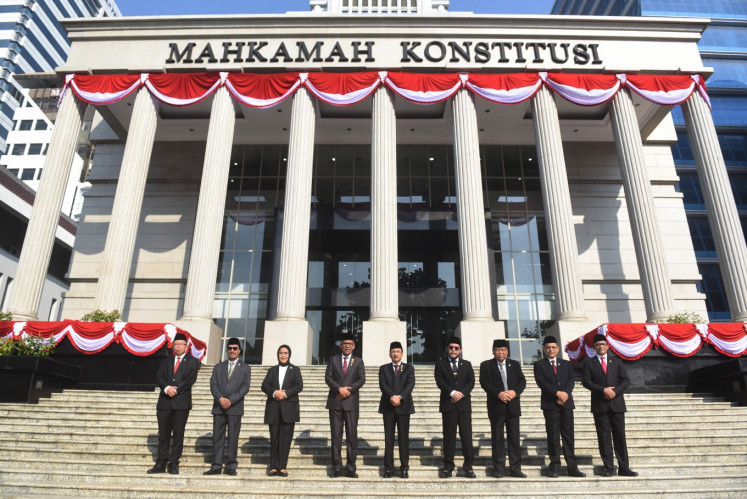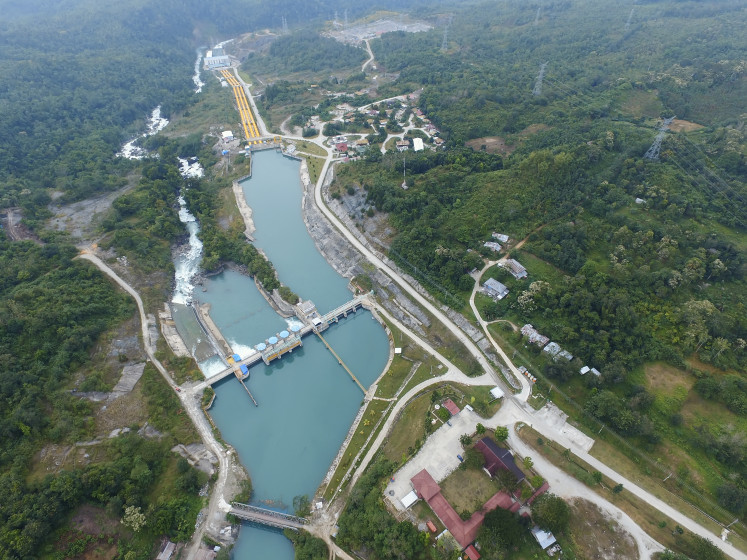Popular Reads
Top Results
Can't find what you're looking for?
View all search resultsPopular Reads
Top Results
Can't find what you're looking for?
View all search resultsCheng Ho Mosque, a symbol of peace
Other than for prayers, visitors also use the Cheng Ho mosque to rest during Ramadhan
Change text size
Gift Premium Articles
to Anyone
 Other than for prayers, visitors also use the Cheng Ho mosque to rest during Ramadhan. (JP/Indra Harsaputra)" border="0" height="341" width="511">Other than for prayers, visitors also use the Cheng Ho mosque to rest during Ramadhan. (JP/Indra Harsaputra)
Other than for prayers, visitors also use the Cheng Ho mosque to rest during Ramadhan. (JP/Indra Harsaputra)" border="0" height="341" width="511">Other than for prayers, visitors also use the Cheng Ho mosque to rest during Ramadhan. (JP/Indra Harsaputra)The afternoon call to prayer came from the Cheng Ho mosque, also known as Muhammad Cheng Ho Surabaya, which boasts Islamic and Chinese architecture.
Susilo Wibowo, who works as a disc jockey at a venue in the East Java capital, was deep in prayer.
The 33-year-old had been fully aware that it would not be easy when he converted from Catholicism to Islam upon his marriage three years ago to a Javanese woman.
âEven today, inter-faith marriage is hard here. The marriage of people of Chinese descent to a Javanese is still not widely accepted,â said Susilo, a Chinese-Indonesian whose family members are Christians and Buddhists.
He said that both his and his wifeâs families had initially opposed their union. His family had declined to accept his wife, whose religion was different from theirs, while his wifeâs family did not approve because they were of different races.
But after they had a son two years into their marriage, their families finally accepted their union.
âNow, every Ramadhan, my non-Muslim family come and we break the fast together,â Susilo says.
Around the mosque, food traders continued to serve customers.
âWeâre a Pancasila country and we should respect otherâs religion and race. Even our independence fighters and the countryâs founding fathers taught us that,â said Mulyono, a fried rice seller within the mosque complex.
He said many non-Muslims who bought food from him chose to take their orders home out of respect for the people fasting.
Other than for prayers, visitors also use the Cheng Ho mosque to rest during Ramadhan. (JP/Indra Harsaputra) The afternoon call to prayer came from the Cheng Ho mosque, also known as Muhammad Cheng Ho Surabaya, which boasts Islamic and Chinese architecture.
Susilo Wibowo, who works as a disc jockey at a venue in the East Java capital, was deep in prayer.
The 33-year-old had been fully aware that it would not be easy when he converted from Catholicism to Islam upon his marriage three years ago to a Javanese woman.
'Even today, inter-faith marriage is hard here. The marriage of people of Chinese descent to a Javanese is still not widely accepted,' said Susilo, a Chinese-Indonesian whose family members are Christians and Buddhists.
He said that both his and his wife's families had initially opposed their union. His family had declined to accept his wife, whose religion was different from theirs, while his wife's family did not approve because they were of different races.
But after they had a son two years into their marriage, their families finally accepted their union.
'Now, every Ramadhan, my non-Muslim family come and we break the fast together,' Susilo says.
Around the mosque, food traders continued to serve customers.
'We're a Pancasila country and we should respect other's religion and race. Even our independence fighters and the country's founding fathers taught us that,' said Mulyono, a fried rice seller within the mosque complex.
He said many non-Muslims who bought food from him chose to take their orders home out of respect for the people fasting.
'I see that non-Muslims place banners wishing Muslims a good fasting month. Even the Chinese and churches hand out breaking-of-the-fast snacks and hold charity events for Idul Fitri,' he said.
Historical accounts describe how Ming Dynasty legend Cheng Ho, also known as Zheng He, embarked upon a world voyage with 30,000 soldiers, officials, accountants, merchants, healers, fortunetellers and interpreters to advance trade, exploration and diplomacy as well as to exchange scientific and cultural knowledge.
The devout Muslim set out on seven exploration missions in all, reaching Sri Lanka, India, the Middle East, Africa and many parts of this country.
The Cheng Ho mosque, built on a 21-by-11-meter plot of land on which stands an 11-by-9-meter main building, can accommodate some 200 people. The design of the mosque, located in a non-Muslim residential and office area in Surabaya, was inspired by the Niu Jie Mosque in Beijing.
East Java Deputy Governor Saifullah Yusuf has referred to the mosque as a symbol of peace among people of different faiths in the province.
'The unison of two cultures, between Chinese and Islam, represents unity. This is a place of worship that symbolizes harmony, love and togetherness despite race or language,' he said.
Your Opinion Matters
Share your experiences, suggestions, and any issues you've encountered on The Jakarta Post. We're here to listen.
Thank You
Thank you for sharing your thoughts. We appreciate your feedback.
Share options
Quickly share this news with your network—keep everyone informed with just a single click!
Gift Premium Articles
to Anyone
Share the best of The Jakarta Post with friends, family, or colleagues. As a subscriber, you can gift 3 to 5 articles each month that anyone can read—no subscription needed!
Continue in the app
Get the best experience—faster access, exclusive features, and a seamless way to stay updated.









